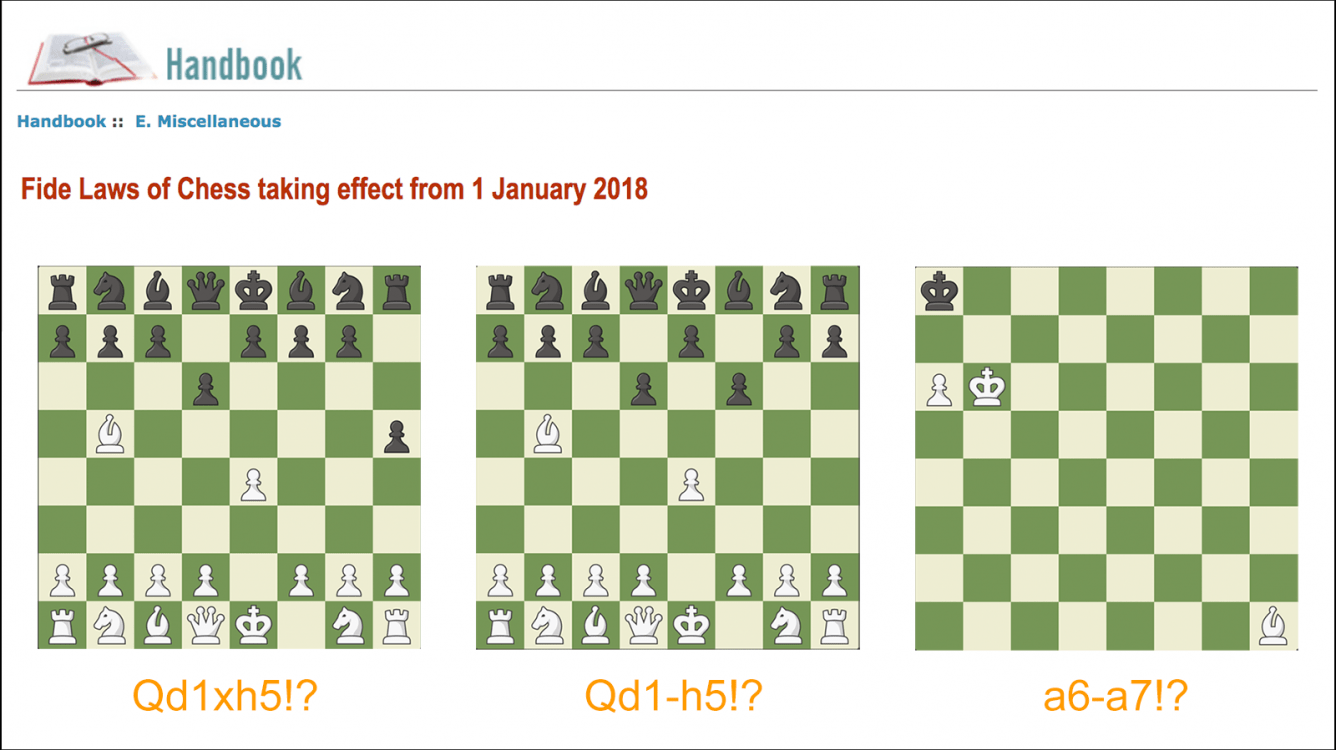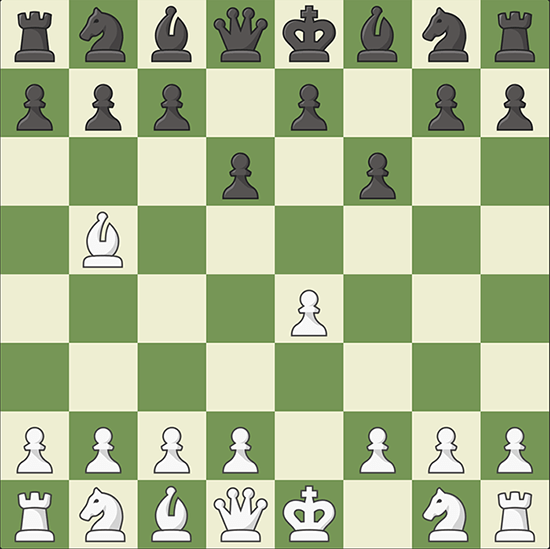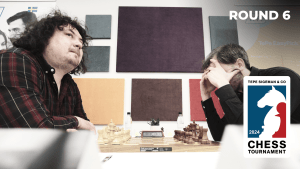
New FIDE Laws Of Chess For Blitz, Rapid Still Not Perfect
As of January 1, the FIDE Laws of Chess are slightly different than before, when it comes to rapid chess and blitz. However, as GM Peter Heine Nielsen and others have pointed out, there's still plenty of room for debate.
The official rules of chess are changed every four years, but for the latest change, FIDE made an exception. During the 88th FIDE Congress, last October in Turkey, amendments to the Laws of Chess 2017 were approved by the FIDE Executive Board. The changes are in effect since the start of the new year.
The reason for this additional change "in between periods" was the desire to equalize the rules for classical chess on the one hand, and rapid and blitz on the other, with regard to the penalty for making an illegal move.
Before, in both rapid or blitz an "illegal move" (which includes moving with two hands, or not making a move and pressing the clock) would instantly lose the game in case the arbiter intervened or the opponent stopped the clock. Now, in the first instance it will lead to a time penalty and only if a player does it again, he or she loses—just like in classical chess.

The FIDE Rules Commission during the 88th FIDE Congress. | Photo: FIDE.
The change is about paragraph A4.2. The old version was:
If the arbiter observes an illegal move has been completed, he shall declare the game lost by the player, provided the opponent has not made his next move. If the arbiter does not intervene, the opponent is entitled to claim a win, provided the opponent has not made his next move. However, the game is drawn if the position is such that the opponent cannot checkmate the player’s king by any possible series of legal moves. If the opponent does not claim and the arbiter does not intervene, the illegal move shall stand and the game shall continue. Once the opponent has made his next move, an illegal move cannot be corrected unless this is agreed by the players without intervention of the arbiter.
The 2018 version reads:
If the arbiter observes an action taken under Article 7.5.1, 7.5.2, 7.5.3 or 7.5.4, he shall act according to Article 7.5.5, provided the opponent has not made his next move. If the arbiter does not intervene, the opponent is entitled to claim, provided the opponent has not made his next move. If the opponent does not claim and the arbiter does not intervene, the illegal move shall stand and the game shall continue. Once the opponent has made his next move, an illegal move cannot be corrected unless this is agreed by the players without intervention of the arbiter.
The articles that are referred to are important to understand the most common scenarios, so we'll give them here as well.
7.5.1 An illegal move is completed once the player has pressed his clock. If during a game it is found that an illegal move has been completed, the position immediately before the irregularity shall be reinstated. If the position immediately before the irregularity cannot be determined, the game shall continue from the last identifiable position prior to the irregularity. Articles 4.3 and 4.7 apply to the move replacing the illegal move. The game shall then continue from this reinstated position.
7.5.2 If the player has moved a pawn to the furthest distant rank, pressed the clock, but not replaced the pawn with a new piece, the move is illegal. The pawn shall be replaced by a queen of the same colour as the pawn.
7.5.3 If the player presses the clock without making a move, it shall be considered and penalized as if an illegal move.
7.5.4 If a player uses two hands to make a single move (for example in case of castling, capturing or promotion) and pressed the clock, it shall be considered and penalized as if an illegal move.
7.5.5 After the action taken under Article 7.5.1, 7.5.2, 7.5.3 or 7.5.4 for the first completed illegal move by a player, the arbiter shall give two minutes extra time to his opponent; for the second completed illegal move by the same player the arbiter shall declare the game lost by this player. However, the game is drawn if the position is such that the opponent cannot checkmate the player’s king by any possible series of legal moves.
Note that there is one slight difference between the rules for rapid games and for blitz. In blitz, the time penalty is one minute instead of two.
According to Takis Nikolopoulos, chairman of the FIDE Arbiters Commission, the new version of paragraph A 4.2 is an attempt to make the rules fairer, and easier to understand. However, it might lead to more complications than before. Danish grandmaster Peter Heine Nielsen came up with an interesting possible situation.
With the new rules for rapid and blitz as of today: After 1 e4 d6 2 Bb5+ h5: White can claim illegal move and get an extra minute on the clock. But can he also play 3 Qxh5 and continue the game? 🤔 pic.twitter.com/1n7XggNYAP
— Peter Heine Nielsen (@PHChess) January 1, 2018
Nikolopoulos said he had received quite a few emails already with similar questions, and that everything would be discussed at the next meeting of the Arbiters Discussion. When asked what he would do, as an arbiter (he was the chief arbiter at the recent World Rapid & Blitz), Nikolopoulos said: "Yes, according to the letter of the law it can happen."
Ashot Vardapetyan, chairman of the FIDE Rules Commission, agrees with Nikolopoulos and goes even further: "It is correct to continue the game like this because the player who made an illegal move will be punished. We have had many discussions over the years in lots of commissions, and one conclusion we made was very clear: a player should not be punished for not seeing that the opponent made an illegal move."
This means that if your opponent misses a check on the first instance, sometimes it might be more useful to make a move instead of claiming: You can win a rook or a queen, instead of a time advantage. This strange situation might be a reason for further fine-tuning of the rules.
Vardapetyan supported his reasoning by giving another hypothetical situation:

Here, Black has accidentally played 1...Ka8 and pressed the clock. According to Vardapetyan, instead of claiming the illegal move White is fully entitled to play 2.a7 checkmate.
Chess.com asked both Nikolopoulos and Vardapetyan about another (rather crazy) situation.

Here, Black has accidentally played 2...f6 which does not get his king out of check. Instead of claiming and getting an extra minute (in blitz) or two (in rapid), White can also decide to play 3.Qh5 and say: checkmate! Black, on the other hand, might claim that it is White who has now made an illegal move.
Vardepetyan said he would indeed declare this a win for White, following the same reasoning: the white player should not be punished for the illegal move made by Black. Nikolopoulos was more careful in his judgment: "This is another interesting case that needs to be discussed at the next meeting."
On a final note, it is interesting to see what would have happened in the Carlsen-Inarkiev incident under the new rules. To refresh your memory: in the first round of the World Blitz Championship, the following happened.
Here Inarkiev went 27...Ne3+. Like Inarkiev, Carlsen forgot that the black king is in check, and played 28.Kd3. Thereupon Inarkiev stopped the clock and claimed a win based on Carlsen playing an illegal move. The board arbiter honored the claim, which was overruled by chief arbiter Nikolopoulos who urged the players to continue the game. Inarkiev refused and unsuccessfully appealed to the decision that Carlsen won the game.
As one chess fan noted on Twitter, according to the new rules White can either claim and get a minute on the clock, or he can play Kd3, which might be the better choice here. Nielsen's reply:
Ahead of his time in more ways that we imagined :-)
— Peter Heine Nielsen (@PHChess) January 1, 2018


